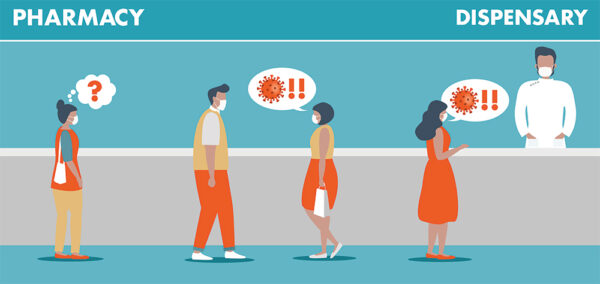The COVID-19 pandemic is the latest victim of innuendo, conspiracy theories and vast misinformation. Pharmacists must educate patients and consumers on facts.
Kevin Ma MPS admits he was lost for words when confronted with a consumer who was his first COVID-19 conspiracy theorist.
The community pharmacist retells the alarming encounter to Australian Pharmacist. A middle-aged woman entered Mr Ma’s Newcastle pharmacy through the out-door (he had set up separate entry and exit points to encourage social distancing some months earlier). The woman told him she was feeling a bit fluey, but a COVID-19 test was out of the question.
‘I’m O positive blood type, so it’s not possible for me to catch coronavirus,’ she informed Mr Ma.
What’s more, she added, the nasal swab was just a ruse so the government could get its hands on people’s brain cells.
‘As you would imagine, she was not too keen on the idea of wearing a mask either,’ Mr Ma says.
‘I really had no idea how to respond to her. I sort of said, “You know, that’s really not the case,” but she was the sort of person who wasn’t really willing to listen.’
Parallel emergencies
The level of medical misinformation circulating on social media has skyrocketed since COVID-19 exploded, and pharmacists have found themselves thrown into the role of educator, allaying the fears of confused, anxious and misinformed patients.
A recent review of literature, jointly compiled by Queensland and ACT academics, published in Research in Social and Administrative Pharmacy1 found that community pharmacists were facing three parallel emergencies that needed to be tackled simultaneously:
- fake medicines
- fake news
- medication misinformation.
The review, led by University of Queensland School of Pharmacy Public Health Researcher Daniel Erku outlined a variety of strategies pharmacists could adopt to fight the ‘infodemic’, including liaising with other health-care professionals.
The use of social media was integral to disseminating appropriate advice and clarifications on COVID-19 preventive and therapeutic measures, the review concluded.
Just don’t tell them they’re wrong…
Senior Lecturer for Sydney Health Ethics at the University of Sydney’s Faculty of Medicine and Health Dr Claire Hooker says there was a lengthy list of ‘dos and don’ts’ for pharmacists seeking to educate misinformed and confused patients.
‘Telling people they are wrong just doesn’t work,’ she says. ‘There are much more effective strategies for tackling any medicine misinformation.’
Crucial to any conversation is the capacity by the pharmacist to understand what the patient is capable – and willing – to understand, she says.
‘It’s hard not to be anxious, because all of us are really conscious of what’s riding on people’s different views and their actions against COVID,’ she says.
‘Taking actions not in line with public health advice can have devastating consequences and we’re all aware of that. But when we are really anxious, it’s more likely we’re not going to be able to communicate very well.’
Don’t be defensive
Once defensiveness kicks in, both sides become reactive, Dr Hooker says.
‘We think we’re looking after someone, but when we try to communicate “that evidence is not correct”, the dominant message we unintentionally convey is that “you are wrong, silly or behaving immorally”. And then they will respond by digging their heels in.’
Dr Hooker says research shows that when we defend core aspects of our identity, we all become much worse in our capacity to critically assess information – an effect that has actually been found to be stronger in people with higher science literacy.
‘Being more well educated and having a higher capacity to understand science does not improve an individual’s ability to assess information, if that information challenges their core values,’ she says.
‘So, if you get defensive, or you make them defensive, they will stop listening to you. Ask questions with genuine curiosity, allow someone to feel heard. And try to find a common ground.’
Negotiation
Willingness to negotiate has its advantages.
‘Find a point of connection or agreement, that gives you the capacity to manoeuvre a little,’ she says. ‘If your goal is simply to change their mind, you will fail. In fact, you could end up making them more entrenched in their misinformation.’
Do they want to stockpile unnecessary medication? Dr Hooker suggests convincing them to present a prescription for an inhaler, then come back another time for more if really necessary, rather than telling them they are behaving irrationally.
They don’t want to wear a mask? Agree that maybe that might not be necessary for them when outdoors, but perhaps in a crowded indoor space they might reconsider? ‘Your best goal might be to keep the lines of communication open, so you can continue to negotiate small shifts into the future.’
Dr Hooker advises pharmacists to be aware of body language, tone of voice, and work on responding to patients with genuine empathy.
‘All of us need to feel very safe and supported before we can question ourselves,’ she says.
A petri dish of conspiracy theories?The emotional and financial insecurity brought about by the COVID-19 pandemic has created the perfect breeding ground for conspiracy theories, many of which were already disseminated on social media before the virus outbreak. Conspiracy theorists have merely retrofitted their message to suit the times, researchers from Queensland University of Technology concluded,2 after delving into the origins of one of the most widespread examples of nonsense that has emerged in the pandemic: the dastardly 5G technology plot – with or without a serve of Bill Gates on the side. Like the virus itself, various strains of this theory have transmuted, but the common thread continues to be a bid by evil government to use COVID-19 testing and treatment to insert mind-reading microchips into the heads of the gullible masses, which will then be activated with the rollout of 5G technology. Other popular conspiracy theories include the deliberate cultivation of the virus in a Wuhan laboratory to hasten the Chinese government’s march towards world domination, and the belief the pandemic was brought on by scheming pharmaceutical companies that will reap billions of dollars in profits from subsequent cures and vaccinations. ‘Lockdown and other government restrictions seemed to lead to a growth in COVID/5G misinformation,’ one of the study’s authors, Dr Edward Hurcombe, told Australia’s Science Channel. ‘This may be due to people assuming some kind of hidden agenda behind them, but also simply a sign of people having more time on their hands to search social media for coronavirus-related content.’ In some cases, a good old-fashioned letterbox drop can spread misinformation almost as effectively. In July, Canberra residents were targeted with leaflets warning that local COVID-19 testing centres had been set up precisely to spread the virus. ‘The aim of testing centres is to spread COVID-19, to reduce global population by 95%, spread fear and enable total government control over all aspects of life under UN Agenda 21,’ the literature proclaimed. It was attributed to a group called NoOneGetsOutAlive.com The message was signed off with the ominous warning: ‘The upcoming COVID-19 “vaccination” will contain a UN tracking device. The flu “vaccination” contains other harmful devices and poisons. Avoid them all!’ |
Vaccination anxiety
As vaccination in the United States has become politicised ahead of the November election, and unexplained illness has paused several key clinical trials, a US poll last month suggests vaccine fears are growing, with 49% of American adults saying they definitely or probably wouldn’t get vaccinated.3 Intent to get a COVID-19 vaccination had fallen from 72% in May.3
A recent YouGov survey in the United Kingdom found that 1 in 6 respondents said they would either ‘probably not’ or ‘definitely not’ get immunised once a COVID-19 vaccine became available.4 That’s almost 20% of the British population. Is there a similar level of distrust and scepticism in Australia?
Research Fellow in vaccine acceptance and communication at the Murdoch Children’s Research Institute in Melbourne Dr Jessica Kaufman says the key to public acceptance of the necessity of immunisation for any disease, including for COVID-19 when a vaccine becomes available, is respectful listening and a quiet conversation.
And don’t call them anti-vaxxers. ‘We call them people who refuse vaccination or those who are hesitant, and among those are parents who may have concerns over a vaccine’s safety, ingredients and possible adverse effects,’ Dr Kaufman says.
‘Anti-vaxxer activists, on the other hand, are a very small minority, who define themselves by their position. And if it’s ideological, then you just can’t force them. You can’t change their minds.’
No silver bullet
Dr Kaufman says there are a number of strategies pharmacists can employ when they encounter someone reluctant to vaccinate themselves or their child.
‘But none are foolproof or easy,’ she admits. ‘Like GPs, pharmacists – if they already have a relationship with a patient – can be the best people to discuss such concerns with, and it may be that the person just wants to be listened to and have their concerns responded to,’ she says.
‘Parents want to be treated as individuals, so make it personal. Some might just want reassurance. Others might want to be shown peer-reviewed research.’
Dr Kaufman says she predicts some level of public resistance to a COVID-19 vaccine when it does emerge.
‘We’ve seen in the United States this really strong emphasis on personal liberty – the “you can’t make me” mindset – on issues like wearing masks and self-isolation. While I don’t think this is as strong in Australia, I think we will see some pushback if the government doesn’t provide the public with enough information.
‘Do we know all the adverse effects? Has the vaccine been carefully enough tested? A lot of people will potentially have these perfectly valid questions and may not be rushing out to get it straight away.
‘We’ve all become scientists with COVID. We want to know the evidence.’
Tips for overcoming vaccine hesitancy
|
PSA communications
Misinformation goes beyond conspiracy theories. It also extends to health professionals who make incorrect assumptions or pass on unverified information via social media. This includes snippets, or parts of information without full context, often in relation to pending regulations.
Communications from PSA to members increased throughout the pandemic to respond quickly to cover major gaps in verified information. It established a dedicated and up-to-date COVID-19 microsite and got its own information and links out via social media, says PSA’s Advocacy and Communications Manager, Monika Boogs.
‘When it came to COVID-19, we provided the information to pharmacists they needed to ensure they were up-to-date with all the latest government regulations and changes that were happening,’ she says. ‘We also did a lot of myth-busting.’
Crucial to the mix has been PSA’s work with federal and state governments, Ms Boogs says.
‘Back in March, after President Trump started promoting hydroxychloroquine as a prophylactic for the virus – and misinformation started to circulate about Ventolin – our members were seeing patients panic buying and trying to stockpile medicines,’ she says.
‘Initially, misinformation between health professionals on regulatory and practice changes was also a problem. The COVID-19 microsite provided an easy-to-read and referenced hub with accurate, trusted information. Our members loved it, and the microsite has become a model for similar microsites on 7CPA and electronic prescriptions,’ says Ms Boogs.
‘We also wrote to the federal government requesting it place a limit on some medicines. The government responded positively and ensured there was enough medicine for all.’
Information overload
The most challenging area in the communications landscape during the pandemic was dispelling myths and tailoring the messages appropriate for each state and territory, Ms Boogs says.
Each jurisdiction was in different stages of lockdown and, with the variations in legislation, it was a constantly evolving communications environment.
‘It was information overload – that was the real challenge we faced,’ she says.
‘But our methods of communication evolved just as COVID evolved, and we adapted and increasingly focused on the information that pharmacists on the ground told us they needed.’
References
- Erku D, Bezabh S, Abrha S, et al. When fear and misinformation go viral: pharmacists’ role in deterring medication misinformation during the ‘infodemic’ surrounding COVID-19. Res Soc Admin Pharm 2020. At: sciencedirect.com/science/article/pii/S1551741120304551#sec2
- Bruns A, Harrington S, Hurcombe E. Corona? 5G? or both?’: the dynamics of COVID-19/5G conspiracy theories on Facebook. Media International Australia 2020. Epub 2020, Aug 4. At: https://eprints.qut.edu.au/203086/
- Pew Research Centre. U.S. public now divided over whether to get VOCID-19 vaccine. 2020. At: pewresearch.org/science/2020/09/17/u-s-public-now-divided-over-whether-to-get-covid-19-vaccine/
- Joley D, Cookson D. Coronavirus anti-vaxxers: one in six British people would refuse a vaccine – here’s how to change their mind. The Conversation 2020. At: https://theconversation.com/coronavirus-anti-vaxxers-one-in-six-british-people-would-refuse-a-vaccine-heres-how-to-change-their-minds-142207






 ‘We’re increasingly seeing incidents where alert fatigue has been identified as a contributing factor. It’s not that there wasn’t an alert in place, but that it was lost among the other alerts the clinician saw,’ Prof Baysari says.
‘We’re increasingly seeing incidents where alert fatigue has been identified as a contributing factor. It’s not that there wasn’t an alert in place, but that it was lost among the other alerts the clinician saw,’ Prof Baysari says.







